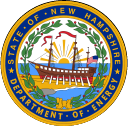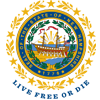Water and Sewer
The Department of Energy and the New Hampshire Public Utilities Commission regulate the services and rates of privately-owned water and sewer utilities. Ten water utilities and five sewer utilities serve customers in New Hampshire.
The Department of Energy (Department) and the New Hampshire Public Utilities Commission (Commission) regulate the services and rates of privately-owned water and sewer utilities. Eleven water utilities and four sewer utilities serve customers in New Hampshire.
The water utilities range in size from less than 50 customers to more than 29,000. Pennichuck Water Works is the largest water utility, serving the greater Nashua area as well as several smaller systems in southern New Hampshire. The water utilities serve approximately 15% of New Hampshire’s residents. Most residents receive water through their municipality or from private wells. It is estimated that 46% of New Hampshire residents receive their water from wells. Except in limited circumstances, municipalities, including precincts and districts, are not considered public utilities. Rather, municipal service and rates are governed by elected representatives.
The four sewer utilities range in size from serving one customer to just over 150 customers. Most residents receive sewer services through their municipality or from private septic systems. Similarly, most of the sewer utilities maintain a contract with an adjacent municipality for waste treatment.
Water and Sewer Bills
For most customers, their water bill consists of two charges: a fixed customer charge and a variable consumption charge. Typically, the customer charge is calculated to recover fixed costs of the utility, such as labor and a return on capital investments. Occasionally, smaller utilities with seasonal customers are allowed to recover other costs through the customer charge to provide some revenue stability. The consumption charge of a water bill is based on periodic meter readings (such as monthly or quarterly) and recovers the costs of providing water, such as costs for chemical treatment and energy to move and deliver water. Charging customers based on usage volume is considered the most effective way to encourage water conservation.
There are a few small unmetered water systems remaining in New Hampshire. Typically, customers of such systems are billed a flat rate, where all customers are charged the same fee, regardless of the amount of water used. Unlike billing based on usage, this method provides no incentive for customers to conserve water.
Sewer rates can be either flat rate or based on a water meter reading. The use of water meter readings for sewer bills serves as an additional incentive to conserve water.
How Water and Sewer Rates Are Set
The New Hampshire Public Utilities Commission (Commission) approves water and sewer rates in adjudicative proceedings. The Department of Energy (Energy) participates as a party in those proceedings and typically files testimony responding to the utilities’ rate requests.
A rate case involves an analysis of a utility’s earnings, operations costs and capital investments such as the water storage tanks, treatment plants, and underground pipes that deliver water to homes and businesses. The law allows a utility to recover the costs of its service as well as a reasonable profit on capital investments used to provide the service. Ultimately, the rates charged to utility customers must be just and reasonable.
Water Quality
RSA 374:1 requires water utilities to provide safe and adequate service. The Department of Energy
(Department) and the New Hampshire Public Utilities Commission (Commission) enforce that
requirement.
New Hampshire water utilities also are required to comply with federal and state water-quality laws,
which necessitate continued improvement of distribution systems and their incurring costs associated
with that compliance. The New Hampshire Department of Environmental Services (NHDES) regulates
compliance with water-quality standards, but the costs of required improvements are recovered from
water utility customers through rates as allowed by the Commission. Since 2018, seven of the eleven
water utilities have petitioned the Commission for rate increases. Water rates range from a low of
about $250 annually to a high of just over $1,200 for a typical year-round residential customer.
Several loan and grant programs assist water utilities with financing the cost of water-quality
improvements, to mitigate the impact of these costs on customers. The Drinking Water State
Revolving Fund (SRF), administered by NHDES, finances capital projects on a competitive basis, based on a project’s impact in achieving the objectives of water quality laws. The SRF program has placed particular emphasis on assisting smaller drinking water systems and those serving less affluent populations. The Drinking Water and Groundwater Advisory Commission oversees distribution of
funds awarded to the state as damages from Exxon-Mobil class action lawsuit for gasoline additive
methyl tertiary butyl ether (MtBE) contamination. The fund, totaling nearly $278 million and co-administered by NHDES, is dedicated to improving existing water infrastructure and developing new sources of safe drinking water.
Related to the need for greater amounts of capital to finance compliance with water-quality laws, over the last decade, many small New Hampshire water utilities have been consolidated into, or acquired by, larger utilities. Those reorganizations have resulted, in most instances, in the adoption of single tariff pricing across the utilities’ customers and systems. Such pricing enables recovery of costs, including those associated with large capital investments, from all of the utility’s customers rather than a segment of customers within one or more separate systems. The more customers paying the costs, the lower the costs per customer.



